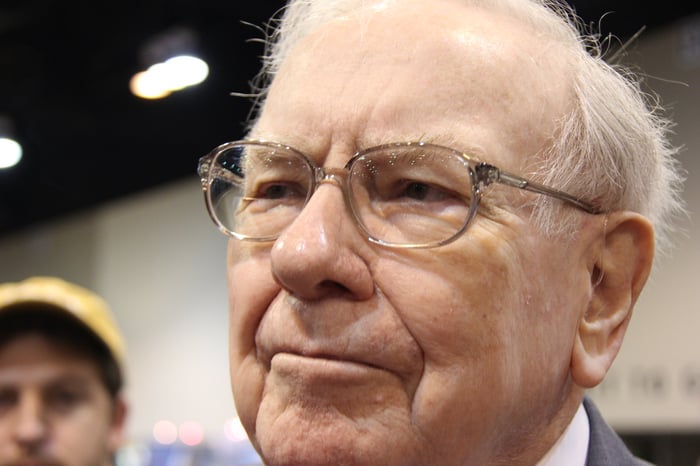Berkshire Hathaway’s Cash Strategy: Buffett’s Caution on Market Valuations
Warren Buffett is globally recognized as a top portfolio manager, and his impressive record is a testament to his skill. Since taking the reins at Berkshire Hathaway (NYSE: BRK.A) (NYSE: BRK.B) in 1965, he has achieved an average compound annual growth rate of 19.8% for shareholders through 2023. For context, the S&P 500 generated a total compound annual return of 10.2% during the same time frame. Additionally, Berkshire has continued to outperform the market in early 2024.
Such substantial long-term success requires expertise in portfolio management and risk evaluation. Historically, Berkshire has outperformed during times when the broader market struggles. Recently, however, Buffett issued a significant warning regarding his current views on the stock market.
After decreasing its equity investments, including notable reductions in Apple (NASDAQ: AAPL) and Bank of America (NYSE: BAC), Berkshire concluded the third quarter with a record $325 billion in cash and Treasury bills, an increase of $48 billion from the previous quarter.
Buffett’s Continued Stock Sales
Buffett has been a net seller of stocks for the past eight quarters. In the second quarter alone, he sold $36.1 billion worth of stock, while purchasing only $1.5 billion. This included significant sales of Apple and Bank of America shares.
According to Berkshire’s quarterly earnings report, Buffett reduced the company’s remaining stake in Apple by 25% during the second quarter, resulting in approximately 300 million shares. This figure is notably less than one-third of the shares Berkshire possessed a year prior.
Buffett first began divesting Apple shares in the fourth quarter of last year but accelerated this in the second quarter. During Berkshire’s annual meeting, he noted it is “extremely likely” that Apple will remain the largest equity holding by year-end. As of the third quarter’s end, Apple still accounted for over 25% of Berkshire’s $271.7 billion portfolio.
In the third quarter, Buffett also focused on Bank of America, selling $9.6 billion of the stock. Additionally, he sold $900 million worth of shares in October, shortly before Berkshire’s holding fell below SEC reporting thresholds.
Buffett mentioned to shareholders that he’s leveraging the current tax laws to realize capital gains at a reduced tax rate. The corporate tax rate is set to increase from 21% to 35% after 2025, which means the gains on the Apple and Bank of America positions are quite substantial.
However, Buffett’s sales seem to reflect his belief that these stocks are trading near or above their intrinsic value. Selling an asset significantly below its worth for tax reasons typically isn’t rational, and although there are other positions within Berkshire’s portfolio with considerable gains, Buffett has chosen to hold them.
Significant Market Warning
One of the clearest signs that Buffett considers many stocks overpriced is the fact that he hasn’t repurchased any shares of Berkshire Hathaway in four months. As of October 21, he did not buy back shares in the first three weeks of the fourth quarter either.
Since mid-2018, after a change in share repurchase policies, Buffett has been able to buy back stock whenever he deemed it undervalued. Over six years, he spent over $77 billion repurchasing shares.
However, in the second quarter, total repurchases dropped to merely $345 million, with no purchases in June. It appears Buffett views the stock price as exceeding intrinsic value in the third quarter, especially as its price-to-book value was above 1.5 for much of the period. This assessment aligns with his thoughts on numerous the equities in Berkshire’s portfolio.
The combination of stock sales, income generation, and minimal share buybacks has led to an increased cash reserve. Now at $325 billion in cash and Treasuries, this amount significantly outweighs Berkshire’s equity investments.
Implications for Investors
In simple terms, Buffett is generally skeptical about the current state of the stock market, particularly concerning Berkshire Hathaway’s holdings.
Valuations appear stretched, as seen in the S&P 500 trading at a forward price-to-earnings ratio of approximately 21.8—much higher than the long-term average of 15.7. Furthermore, the Shiller CAPE ratio is over 36, a level observed briefly in 2021 before the market downturn the following year. The metric was similarly high before the dot-com bubble burst.
It’s important to note that Buffett’s situation differs drastically from that of the average investor. With an equity portfolio valued at about $280 billion and cash and Treasuries at $325 billion, his options are somewhat limited. As he mentioned in his 2023 shareholder letter, there “are only a handful of companies in this country capable of truly moving the needle at Berkshire.” This implies that for Berkshire to invest, it must be in significantly large companies.
This distinction matters for individual investors. Smaller investors have access to a wider range of opportunities. Buffett, addressing this at the recent annual meeting, stated, “I would not like to be running $10 billion now. $10 million I think we could, I think Charlie or I could earn high returns on.” Thus, while Buffett may not find large-cap stocks appealing, there could be attractive prospects in smaller- and mid-cap stocks.
Explore New Investment Opportunities
If you have ever felt like you missed out on buying top-performing stocks, now might be your chance.
On rare occasions, our expert team of analysts issues a “Double Down” stock recommendation for companies they believe are poised for significant growth. If you’re concerned you’ve missed your opportunity to invest, now could be the best time to act.
- Amazon: If you invested $1,000 when we doubled down in 2010, you’d have $23,324!*
- Apple: If you invested $1,000 when we doubled down in 2008, you’d have $42,133!*
- Netflix: If you invested $1,000 when we doubled down in 2004, you’d have $420,761!*
Currently, we’re issuing “Double Down” alerts for three outstanding companies, and this may be one of your last chances to seize such opportunities.
See 3 “Double Down” stocks »
*Stock Advisor returns as of November 4, 2024
Bank of America is an advertising partner of Motley Fool Money. Adam Levy has positions in Apple. The Motley Fool has positions in and recommends Apple, Bank of America, and Berkshire Hathaway. The Motley Fool has a disclosure policy.
The views expressed here are the author’s and do not necessarily reflect those of Nasdaq, Inc.






